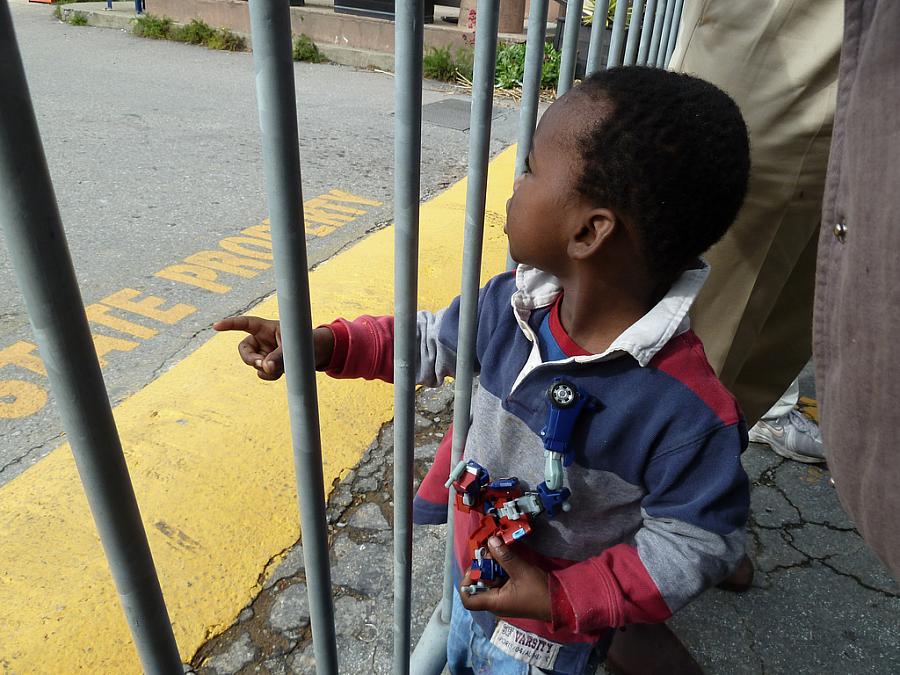Parent's incarceration linked to health problems in children

It won’t surprise anyone to learn that the incarceration of parents has negative impacts on their children.
But the ripple effects of locking up parents may be even worse than we thought, at least when it comes to kids’ health. And since incarceration rates are disproportionately high among low-income and minority families, that means those already at higher risk for poor health are bearing the added weight of having a parent behind bars.
This is not a small group: Researchers estimate that about 2.6 million U.S. kids have a parent in prison or jail at any given moment. And after three decades of soaring growth in the prison population, the United States has the dubious distinction of having highest incarceration rate in the world. With men comprising 93 percent of prisoners, a kid with a parent behind bars is typically without a father.
There may be no better sign that parental incarceration is an issue for more and more kids these days than the fact that last year Sesame Street introduced a character named Alex, whose father is in jail. In one segment, Alex struggles to explain to his friends why his dad isn’t around.
UC Irvine sociologist Kristin Turney has taken a new look at how a parent’s lockup affects their children’s health in a study that uses data from the 2011–2012 National Survey of Children’s Health.
Among otherwise similar children, Turney found that kids with a parent in lockup are more likely to have a host of health and behavior problems. In her study, published in the September issue of the Journal of Health and Human Behavior, Turney writes:
After adjusting for demographic, socioeconomic, and familial characteristics, I find that parental incarceration is independently associated with learning disabilities, attention deficit disorder and attention deficit hyperactivity disorder, behavioral or conduct problems, developmental delays, and speech or language problems.
Those findings appear to mesh with earlier well-known research that has shown that the more adverse experiences a child endures, the more health and well-being issues later in life.
“The results suggest that children’s health disadvantages are an overlooked and unintended consequence of mass incarceration,” Turney said in a statement. “In addition, given its unequal distribution across the population, incarceration may have implications for racial and social class inequalities in children’s health.”
Such inequalities are borne out by the fact that about 50 percent of black children whose fathers don’t have a high school diploma will have a parent behind bars by the age of 14, according to Turney. That compares with 7 percent of white kids whose fathers lack a diploma.
Another recent study from Brown University researchers found that those who had a family member who was incarcerated while growing up had an 18 percent greater chance of poor health in adulthood.
“These people were children when this happened, and it was a significant disruptive event,” said the study’s lead author, Annie Gjelsvik, an assistant professor of epidemiology at Brown University’s School of Public Health. “That disruptive event has long-term adverse consequences.”
(As always, correlation is not causation, and it can be tricky for researchers to tease out just how much these health and behavioral problems are caused by a parent’s lockup rather than the unstable home or other forms of adversity that are more likely to occur alongside or lead to incarceration.)
Recognition of the link between the health of kids and teens and incarceration isn’t new. Earlier research found that teen pregnancies and sexually transmitted infections increased with parents’ incarceration rates. The researchers even documented a dramatic jump in teen pregnancy rates in North Carolina from 1995 to 1996, when there was also a big jump in the prison population. They attributed it to the imbalance in the male and female populations in many African American communities, which they speculated gave men more power in relationships. “Lower gender ratios have been shown to affect rates of teenage pregnancy, syphilis, and gonorrhea,” researchers wrote in the 2006 study.
Reporter John Tierney covered that research and other studies in a 2013 New York Times’ story that deftly merged the relevant science with the narrative of a family coping with lockup’s long shadow. Tierney touched upon the many ways that incarceration can erode a family’s well-being:
Christopher Wildeman, a Yale sociologist, has found that children are generally more likely to suffer academically and socially after the incarceration of a parent. Boys left fatherless become more physically aggressive. Spouses of prisoners become more prone to depression and other mental and physical problems.
While it seems obvious that any real attempt to reverse such health effects will have to grapple with the deep structural causes – economic, racial, legal – underlying U.S. incarceration rates, UC Irvine’s Turney suggested a more practicable first step.
Drawing a line from her study to the health care providers who work in communities suffering high crime and incarceration rates, Turney said: “Physicians serving poor communities where incarceration is common may consider screening children for parental incarceration, as it is a risk factor that, in some cases, is more consequential than other forms of parental absence like divorce.”
Photo by Cary Bass-Deschenesvia via Flickr.
